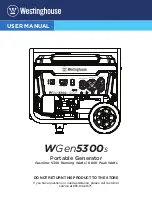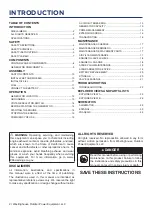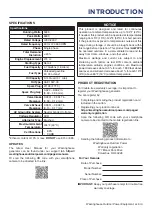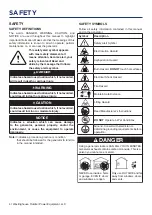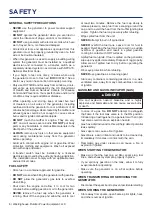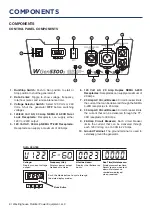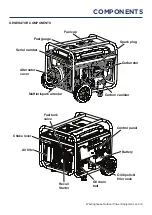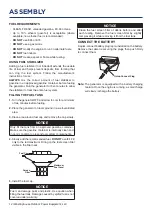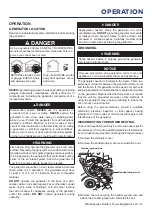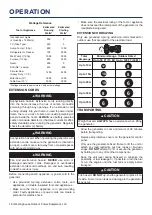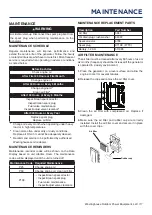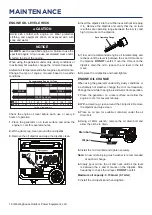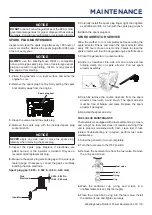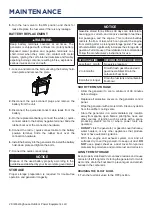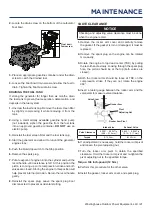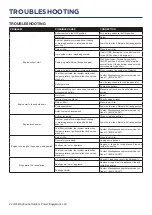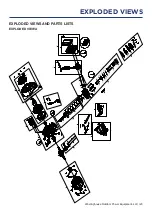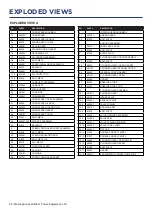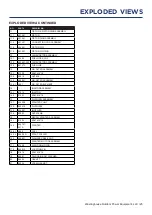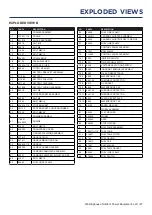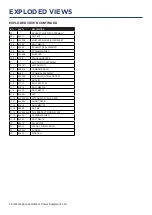
Westinghouse Outdoor Power Equipment, LLC | 15
STOPPING THE ENGINE
1.
Turn off and unplug all connected electrical loads.
IMPORTANT: NEVER
start or stop the generator with
electrical devices connected.
2.
Let the generator run with no load for several minutes to
stabilize internal temperatures of the engine.
3.
Push the Run/Stop switch to the Stop position.
Note:
Alternately, if the generator is used infrequently, turn
the fuel tank valve to the OFF position to limit the
residual fuel remaining in the carburetor float bowl.
The engine will stop when fuel in the carburetor and
fuel line is exhausted.
FREQUENCY OF USE
If the generator will be used on an infrequent or intermittent
basis (more than one month before next use), refer to the
Storage section of this manual for information regarding
fuel deterioration.
AC CIRCUIT BREAKERS
The circuit breakers will automatically switch OFF if there
is a short circuit or a significant overload of the generator
at each receptacle.
If an AC circuit breaker switches OFF automatically,
check that the appliance is working correctly and it does
not exceed the rated load capacity of the circuit before
resetting the AC circuit breaker ON.
Push to Reset
ON
OFF
Circuit Breakers
GENERATOR CAPACITY
NOTICE
DO NOT
overload the generator’s capacity. Exceeding
the generator’s wattage/amperage capacity can damage
the generator and/or electrical devices connected to it.
Make sure the generator can supply enough continuous
(running) and surge (starting) watts for the items you will
power at the same time.
The total power requirements (Volts x Amps = Watts) of all
appliances connected must be considered. Appliance and
power tool manufacturers usually list rating information
near the model or serial number.
To determine power requirements:
1.
Select the items you will power at the same time.
2.
Total the continuous (running) watts of these items. This
is the amount of power the generator must produce
to keep the items running. See the wattage reference
chart.
3.
Estimate how many surge (starting) watts you will need.
Surge wattage is the short burst of power needed to
start electric motor-driven tools or appliances such as a
circular saw or refrigerator. Because not all motors start
at the same time, total surge watts can be estimated by
adding only the item(s) with the highest additional surge
watts to the total rated watts from step 2.
Example:
Tool or Appliance
Running
Watts*
Starting
Watts*
RV Air Conditioner (11,000 BTU)
1010
1600
TV (Tube Type)
300
0
RV Refrigerator
180
600
Radio
200
0
Light (75 Watts)
300
0
Coffee Maker
600
0
2590 Total
Running
Watts*
1600
Highest
Starting
Watts*
Total Running Watts
2590
Highest Starting Watts
+ 1600
Total Starting Watts Needed
4190
*Wattages listed are approximate. Verify actual wattage.
POWER MANAGEMENT
To prolong the life of the generator and attached devices,
use care when adding electrical loads to the generator.
There should be nothing connected to the generator
outlets before starting the engine. The correct and safe
way to manage generator power is to sequentially add
loads as follows:
1.
With nothing connected to the generator, start the
engine as described in this manual.
2.
Plug in and turn on the first load, preferably the largest
load you have.
3.
Permit the generator output to stabilize (engine runs
smoothly and attached device operates properly).
4.
Plug in and turn on the next load.
5.
Again, permit the generator to stabilize.
6.
Repeat steps 4 and 5 for each additional load.
OPERATION

